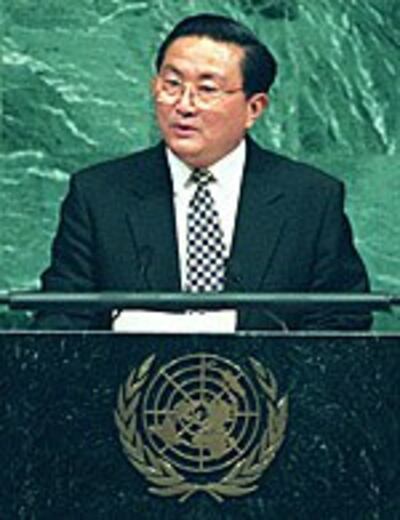
WASHINGTON—A senior Chinese official is urging authorities in the largely Muslim Xinjiang to prepare for danger and renew their “strike hard” campaign against separatism, as the northwestern region marks 50 years under Chinese rule this week.
"We hope all politics and law officials, the soldiers of the armed police and the People's Liberation Army ... can thoroughly safeguard social order, advance ethnic unity, and maintain lasting political stability," the official People's Daily quoted top law official Luo Gan saying on a visit to the Xinjiang capital, Urumqi.
“We must continue to strike hard at all criminal activities and handle well the overall administration of social order,” he said. “The soldiers of the armed police must continue to raise their levels of deployment and capacity to intervene, continue to raise their powers in the fight against terrorism and their powers to safeguard the construction, development and stability of Xinjiang.”
Luo was leading a delegation observing the 50th anniversary of Xinjiang's establishment as a Chinese autonomous region, Luo called on local security officials to "keep a clear mind" in combating Muslim separatists, the official China Daily said.
Luo has emerged as senior government point man on law enforcement issues. In December 2004, he called for greater vigilance against the Falun Gong spiritual movement, which Beijing has banned as “an evil cult,” and against separatist movements in Tibet and Xinjiang.
We hope all politics and law officials, the soldiers of the armed police and the People's Liberation Army ... can thoroughly safeguard social order, advance ethnic unity, and maintain lasting political stability...We must continue to strike hard at all criminal activities and handle well the overall administration of social order.
Luo is charged with law enforcement for the standing committee of the powerful Politburo. He described overall security in the Xinjiang Autonomous Region as satisfactory but called on police and other security agencies to "be prepared for danger," China Daily said.
Uyghur dissident complains
Uyghur dissident Rebiya Kadeer, exiled from China to the United States earlier this year, said any increase in dissent in Xinjiang likely reflected the Uyghur people’s frustration in living under Chinese rule.
“In 50 years under Chinese rule, the Uyghur people have lost their culture and… their traditions, and they have lost ground economically and ecologically,” Kadeer said.
She also cited reports of unrest and low morale among the military-backed Xinjiang Production and Construction Corps, known in Chinese as thebingtuan.
“If Uyghur society is as happy as the government says it is, why are the authorities always emphasizing that their top priority is political stability and not economic development in the Uyghur Autonomous Region?” she asked.
Kadeer, who has said she was warned against lobbying for for the Uyghur cause before she left China, also complained about what she described as Chinese efforts to tarnish her image internationally.
“They are trying to stop my human right activities. They don’t want the international community to hear the voice of the Uyghur people,” she said.
In 50 years under Chinese rule, the Uyghur people have lost their culture and… their traditions, and they have lost ground economically and ecologically. If Uyghur society is as happy as the government says it is, why are the authorities always emphasizing that their top priority is political stability and not economic development in the Uyghur Autonomous Region?
China seeks 'stability'
Uyghurs constitute a distinct, Turkic-speaking, Muslim minority in northwestern China and Central Asia. They declared two short-lived East Turkestan Republics in the 1930s and 40s but have remained under Beijing’s control since 1949.
China's "stability" policy in Xinjiang began with the establishment of the Xinjiang Production and Construction Corps, or bingtuan, in 1949, in an effort to provide land and work for demobilized People's Liberation Army troops.
Today, the bingtuan is a vast, quasi-military organization with a population of at least 2.5 million people, roughly one-seventh of the total population of the region.
Around 98 percent of the Han Chinese population are located in urban areas, while about 90 percent of Uyghurs live in rural areas. Uyghur groups estimate that the income of Han Chinese in the region is around 3.6 times that of the Uyghurs.
Some academics predict the Muslim, Turkic-speaking Uyghurs will soon become an ethnic minority in their own land.
Human rights groups and Western governments routinely criticize China for its heavy-handed treatment of the Uyghur population in Xinjiang. Beijing has backed the U.S.-led war on terror and called for international support for its campaign against Uyghur separatists, whom it has branded terrorists.
Chinese authorities recently reported that more than 260 “terrorist acts” had occurred in the region since the mid-1980s, when a local separatist movement became more active.
Original reporting by Omutwar for RFA's Uyghur service. RFA service director: Dolkun Kamberi. Written and produced for the Web in English by Sarah Jackson-Han.
